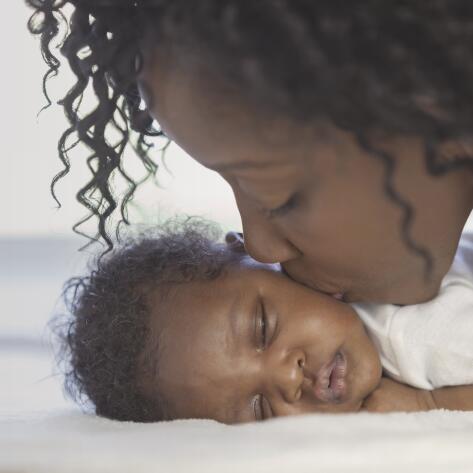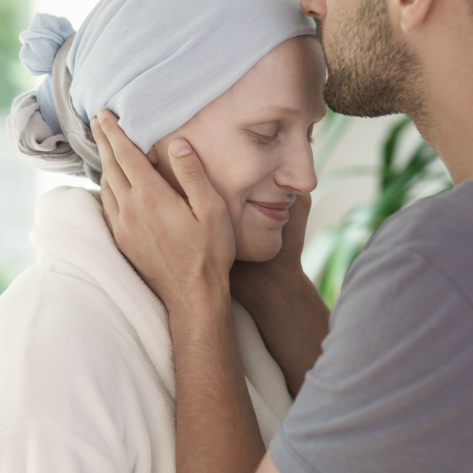
When severe hair loss occurs suddenly, it is often reactive hair loss.
Unlike androgenetic alopecia, which is genetic, reactive hair loss, as its name indicates, occurs in response to an external factor. It can be stress, pregnancy, breastfeeding, a change of season, fatigue, illness, iron deficiency…
Hair loss usually occurs two to three months after the event.
This type of hair loss can affect the entire head and is more common in women.
THERE ARE THREE MAIN CAUSES OF REACTIVE HAIR LOSS.
?t=crop&x=0.166&y=0.000&width=0.667&height=1.000&outputWidth=472&outputHeight=472)
Stress, severe fatigue, and emotional shock can cause chain reactions in the body, including hair loss. They have an impact at the cellular level and on the hair follicles. They have harmful effects on the scalp and can alter hair growth.

Hair loss after pregnancy is quite common in women.
A few months after giving birth, which has both physical and mental effects, a number of women notice that they easily lose more than 100 hairs a day, which strikes them as abnormal. This hair loss in women may be due to hormonal changes caused by pregnancy, particularly due to an imbalance in male hormones.

There are many links between hair loss and illness.
Hair loss can itself have pathological causes, as in the case of androgenetic alopecia.
It can also be a side effect of taking a prescribed treatment for an illness or chemotherapy.

Don't panic, you're not the only one losing hair as a result of Covid. Covid took us all by surprise and we have not yet seen all of its direct and indirect consequences.
Reactive hair loss, also known as telogen effluvium, is when a significant number of hair follicles enter prematurely into the hair loss phase. This third and final phase of the hair life cycle is also called the telogen phase.
Reactive hair loss is a temporary phenomenon.
To treat this type of hair loss, it is necessary to quickly reactivate hair growth by initiating a new hair cycle and slowing down hair loss.
Various events can cause severe hair loss:
Stress, fatigue, illness, pregnancy and deficiencies all have harmful effects on the life of hair and can lead to hair loss.

There are three main physiological causes.
Growth factors responsible for the development of the circulation of the follicular papilla are essential in the regulation of hair growth.
Poor scalp circulation can lead to a lack of nutrients reaching the hair bulbs. These elements are essential for hair growth. A deficiency can therefore trigger hair loss.
It is thus necessary to ensure good microcirculation at the scalp to ensure these elements are present.
Caption 1 . HEALTHY BULB
2 . POOR VASCULARIZATION: impaired microcirculation

We have seen that microcirculation carries essential elements to the hair bulb.
Even if blood circulation is very good, it still needs to have growth elements to transport to the hair bulb!
It goes without saying that a lack of nutrients, energy and trace elements makes it more difficult to grow healthy hair. A deficiency therefore leads to the hair entering prematurely into the telogen phase.
It is therefore essential to provide the hair with these essential elements in another way. We can, for example, use food supplements to provide amino acids, vitamins…
Caption 1 . HEALTHY BULB
2 . POOR NUTRITION: reduced intake of nutrients and energy

Psychological or physical stress or a disorder of the body will generate an imbalance that translates into stress at a cellular level.
Cells on the scalp subjected to this stress will release neuromediators, including substance P. They will then trigger an acute inflammatory knock-on effect.
A pro-inflammatory agent, TNF-a, is released. It inhibits the hair cycle: the hair then suddenly and prematurely enters the telogen phase.
This triggers a sudden and drastic hair loss.
Caption 1 . HEALTHY BULB
2 . INFLAMMATION: cellular stress releases substances, triggering premature hair loss

As we have just seen, reactive hair loss has three underlying physiological causes.
It can be difficult to identify which of these is the main culprit. It is also impossible to determine whether it acts alone or in combination with other factors.
To slow down reactionary hair loss and obtain visible results, it is therefore preferable to target these three causes simultaneously.
For this type of hair loss, it is, of course, useless to consider a hair transplant. Today, there are anti-hair loss treatments made with natural active ingredients that are effective and aren't harsh on the skin.
Massaging the scalp can be very effective in increasing the effects of an anti-hair loss treatment. These extra gestures should not be neglected.

